What is Artificial intelligence?
Brief Introduction to Cutting-Edge Technology

Title: Harnessing the Power of Artificial Intelligence: The Evolution and Impact on Society
Introduction
Artificial Intelligence (AI) has emerged as one of the most transformative and influential technologies of the 21st century. From self-driving cars to virtual personal assistants, AI has penetrated various aspects of our daily lives, revolutionizing industries and redefining how we interact with technology. As AI continues to evolve and grow, its impact on society becomes more profound, raising both hopes and concerns about its implications. In this article, we will explore the evolution of AI, its applications, and its impact on society.
The Evolution of AI
AI is not a new concept; its origins can be traced back to the 1950s when computer scientists began exploring ways to enable machines to perform tasks that required human intelligence. The term "Artificial Intelligence" was coined by John McCarthy in 1956, and since then, the field has witnessed several waves of advancements.
The first wave focused on symbolic AI, wherein systems were designed to follow strict rules and logical reasoning. However, these early AI systems faced limitations due to the complexity of real-world problems and the difficulty of encoding all the necessary rules manually.
The second wave saw the rise of machine learning, where AI systems learned from data rather than being explicitly programmed. This breakthrough led to significant progress in areas such as computer vision, speech recognition, and natural language processing.
Currently, we are experiencing the third wave of AI, known as deep learning, where artificial neural networks with multiple layers mimic the structure and functioning of the human brain. Deep learning has driven exceptional advancements in areas like image and speech recognition, enabling AI to achieve human-level performance in various tasks.
Applications of AI
AI has penetrated numerous sectors, impacting industries, businesses, and individuals alike.
1. Healthcare: AI is revolutionizing healthcare with applications in medical imaging analysis, disease diagnosis, drug discovery, and personalized treatment plans. AI-powered systems can analyze vast amounts of patient data to assist physicians in making more accurate and timely decisions.
2. Finance: In the financial sector, AI is being utilized for fraud detection, algorithmic trading, and customer service through chatbots. These applications enhance efficiency and reduce errors, leading to better financial services.
3. Transportation: Self-driving cars represent a major breakthrough in AI applications. Autonomous vehicles have the potential to reduce accidents, traffic congestion, and carbon emissions while making transportation more accessible and efficient.
4. Entertainment: AI is reshaping the entertainment industry through recommendation systems that suggest movies, music, and content tailored to individual preferences. AI is also being employed in video game development to create more immersive and realistic experiences.
5. Education: AI-driven adaptive learning platforms personalize educational content to meet the unique needs of students, enhancing their learning experience and improving overall academic outcomes.
The Impact of AI on Society
AI's pervasive influence has both positive and negative consequences on society:
1. Economic Impact: AI has the potential to boost productivity and economic growth by automating repetitive tasks, leading to cost savings for businesses. However, it also raises concerns about job displacement as certain roles become automated, requiring re-skilling and upskilling for the workforce.
2. Ethical Considerations: As AI becomes more sophisticated, ethical considerations become critical. Issues like bias in AI algorithms, privacy concerns, and the use of AI in autonomous weapons necessitate careful regulation and responsible development.
3. Healthcare Advancements: AI's integration in healthcare promises significant advancements, such as early disease detection and personalized treatments. However, ensuring the ethical use of patient data and addressing concerns about data privacy are paramount.
4. Education Accessibility: AI-powered educational platforms have the potential to bridge educational gaps and provide access to quality education globally. Nonetheless, ensuring fair and equitable access to AI-driven educational resources remains a challenge.
5. Dependence on AI: As AI systems become more capable, there is a risk of excessive reliance on them, potentially reducing human agency and critical thinking skills. Balancing the role of AI as a tool with human decision-making is essential.
Conclusion
Artificial Intelligence has come a long way since its inception, transforming our world in profound ways. Its applications span across industries, offering numerous benefits and opportunities. However, as AI continues to evolve, we must address the ethical, social, and economic challenges it presents. By promoting responsible AI development, fostering transparency, and prioritizing human-centric values, we can harness the full potential of AI to create a brighter and more inclusive future for society.Start writing...
About the Creator
Enjoyed the story? Support the Creator.
Subscribe for free to receive all their stories in your feed. You could also pledge your support or give them a one-off tip, letting them know you appreciate their work.





Comments
There are no comments for this story
Be the first to respond and start the conversation.